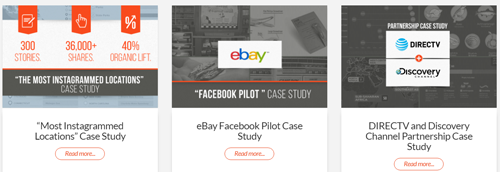How to Build an Authoritative Website through Quality Content

A company's website generally serves to drive sales and/or strengthen brand awareness and reputation.
In the latter case, the best way to grow your brand via your website is to build authority with quality content in order to improve search rankings and increase social engagement. Are you confident in the clout your content brings?
Four Tips for Building Trust with Authoritative Content
In terms of Internet marketing, what is authority? Most would agree that it's the title associated with being a "thought leader" on a particular topic. For example, Google is seen as an authority on Internet search traffic. Apple is viewed as an authority on mobile devices. Sherwin Williams is seen as an authority on paint. The list goes on and on.
But how do brands achieve the status of thought leader? Well, aside from the obvious - producing quality products for a long period of time - it comes down to marketing. If you want to be seen as a reputable brand, you must build a website that focuses on quality content creation and distribution.
Ultimately, you have to build trust with your audience. Here are a few of the top tips for building trust via authoritative content that resonates with your target demographic:
1. Stop Advertising and Start Contributing
"Like any other consumers, online audiences are seeking to consume relevant, valuable knowledge. Luckily, you have the power to give them exactly what they want," marketer Daniel Glickman says. "But first, you need to stop contributing only to benefit yourself. Creating content simply for your own marketing benefits will never get you the same results as contributing genuinely for the benefit of the community."
This is what separates the great websites from the average ones. Today's consumers are incredibly savvy and understand the differences between advertisements that are guised as content and actual content that adds value to the conversation at hand. Make sure you're contributing - not advertising.
2. Reference and Quote Authority Figures
One of the best strategies for establishing trust is to stop speaking and begin letting authority figures in your industry tell the stories you want to convey. Not only does this strengthen your brand's image in the eyes of consumers, but it also familiarizes authority figures with your brand.
Here's a great example of how Target Tamers, a review site for hunting optics, uses quotes from renowned hunters to bolster the validity of their messaging or how Website Magazine curated responses from industry experts on content marketing for SEO. Can you find similar ways to do this? Not only will those quoted share the content on social media but so will their networks.

3. Use Data and Facts
Nothing is more reliable than data and facts. So, if you want to make a valid point, you should identify and use figures that back up your point. Known as data-driven posts, these pieces of content are highly shareable and show that you've done your research before writing.
This post does a good job of explaining how to write a data driven post, but it's also a fantastic example of a data driven post on its own. Check out the various studies, facts, and figures it uses to convey the message.
4. Post Case Studies and Whitepapers
When you're trying to convince people to buy into your message, few things are more effective than case studies and whitepapers. Case studies are particularly valuable because they synthesize large amounts of information in a relevant storytelling format that resonates with a specific demographic.
Check out how Fractl, a large content marketing agency, uses case studies to bolster its reputation. While it's not easy or cheap to publish case studies, they typically deliver a strong return.

Don't Skimp on Content
While it's possible to publish low-quality content that still gets shared, it's impossible to thrive without superior content that resonates with your audience and establishes trust. If you want your website - and ultimately your brand - to be viewed as an authority figure by customers and search engines, then you can't cut any corners.







